Square vs Squarespace 2024: A Head to Head Comparison
Our independent research projects and impartial reviews are funded in part by affiliate commissions, at no extra cost to our readers. Learn more
Though they sound similar, in the Square vs. Squarespace battle, the differences were many, and we’ve considered every relevant aspect to find the best website builder for you. Square Online is an ecommerce website builder that lets you sell for free, with a great POS system used by businesses all over the world. Squarespace on the other hand is a more design-focused builder, but one that still has access to really strong sales features.
Let’s take a closer look at each builder and see who we recommend each one for:
Square Online is better if…you have a real-life physical business and are looking to start selling online.
Square Online’s features are weaker than other competitors, but what it excels in is being able to sell for free and having great synergy between physical and online business with its POS systems. Using Square Online, you can easily sell a few items online while running your usual store with very little hassle.Squarespace is better if…you want a good-looking website for great value for money.
Squarespace has the best value-for-money score of any website builder we’ve tested. For the starting price of $16 per month (billed annually), you get access to choose from some of the best professionally designed templates. If you want to start a website off with a bang, Squarespace is a fantastic all-rounder.In this article, we’ll put our hours of testing and research into action to compare these two platforms head-to-head. Spoiler alert: Squarespace was the overall winner in this competition. That said, it’s not for everyone. To be more specific, we recommend Squarespace for stores that are growing, and stores focused on building a unique brand. We recommend Square Online for existing brick-and-mortar stores looking to start selling online, or for people without a formal store who just want to sell a few products online.
Now, let’s find out how we came to this conclusion!
Square Online vs Squarespace: Pros and Cons
No provider is objectively perfect, but they may be perfect for you. Let’s take a look at both Square Online’s and Squarespace’s pros and cons:
Square Online Pros and Cons
Pros
- Easy to use: Square Online’s dashboard is straightforward and beginner-friendly
- Affordable: You can start selling products for free
- Great inventory management: Square Online makes it simple to stay organized and keep track of stock
Cons
- Limited payment processors: You’ll have to pay extra fees if you don’t use Square’s in-house payment processor
- Mediocre templates: Template designs are clean, but uninspiring
- Limited customization: Square Online’s templates don’t offer much design flexibility, so you can’t improve them very much
Squarespace Pros and Cons
Pros
- Stunning template designs: Squarespace’s templates are all unique, stylish, and easy to customize
- Powerful built-in features: You’ll have advanced marketing tools at your fingertips
- Great value for money: Squarespace is the best value-for-money builder we’ve tested
Cons
- Doesn’t autosave your work: You’ll have to keep saving your work as you go
- No phone support: You can speak to the support team via live chat and email, but not over the phone
Quick Comparison
See how each of the providers shapes up in this quick comparison graph:
| Squarespace | Square Online | |
|---|---|---|
| Ease of Use Winner: Squarespace | Squarespace’s drag-and-drop editor is incredibly user-friendly and its professionally-built designs make it easy to build a stunning website. | Square Online is simple to use, but unfortunately lacks a lot of the features and tools that Squarespace has. |
| Value for Money Winner: Squarespace | Squarespace may not have a free plan, but its plans are much better value for money in how in-depth of a website it lets you create. | Square Online lets you sell for free, but after its paid plans increased in price from $12 per month to $29 per month, it makes it harder to recommend to upgraders and switchers. |
| Design Functionalities Winner: Squarespace | Squarespace’s high-quality designs and templates are the best of the best. Its templates are modern, trendy, and aesthetically pleasing, plus designed for a number of industries if your are thinking of switching from another provider. | Square Online offers decent templates but they’re nothing special in comparison to other builders. |
| Selling Online Winner: Squarespace | Squarespace has all the ecommerce tools you need, making it easy to switch or upgrade your store from a different provider. It's ecommerce templates are designed around a number of industries, giving your business the support it needs right away. | Square Online may let you sell for free, but its features are quite basic unless you upgrade. |
| Payment Options Winner: Squarespace | Squarespace offers more options, plus totally waives away transaction fees on two of its three ecommerce plans. | Square Online falters in this regard, despite being an ecommerce-focused platform, by only having three payment options to choose from |
| Marketing Features It's a Tie! | You’ll have access to lots of SEO features, including keyword support and the ability to edit meta tags. Squarespace also allows users to submit a sitemap. | Square Online has very robust marketing features, letting you edit each individual pages SEO while also sending automatic emails out to customers. |
| Apps Winner: Squarespace | Squarespace used to have poor app support. However, the inclusion of Squarespace Extensions gives users high quality app integrations, meaning you won't have to start from scratch if your switching over. | Square Online has all the integrations and omnichannel selling an ecommerce platform needs, but unfortunately the app store in not as strong as Squarespace's. |
| Security and Performance It's a Tie! | Squarespace has the consistent performance expected of well-known website builder. SSL certification comes as standard. | Square Online also offers SSL certification as standard, as well consistent perfromance. |
| Help and Support Winner: Squarespace | You can contact Squarespace via email 24/7, social media channels, and weekly live chat support. It doesn’t offer phone support but Squarespace’s Help Center is incredibly thorough and detailed. | Square Online offers 24/7 phone support. However, its Help Center is outdated and messy. |
| Are You Ready? | Visit Squarespace | Visit Square Online |
Which Is Easier to Use?
The Winner
Squarespace is the easiest to use
Signing Up
Both Square Online and Squarespace make the signup process as quick and easy as possible, and we were actually more impressed by Squarespace’s onboarding than Square Online’s.
Once we chose a Squarespace template, we got to click through a quick mini-guide on using the template editor.

Square Online also offers helpful setup guides as you go along.
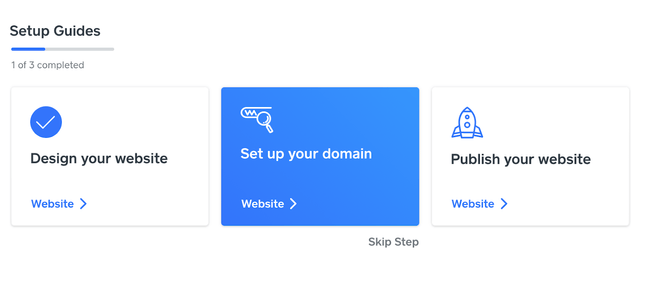
Square Online’s setup guides are really helpful, but you’ll find them in your dashboard after the signup process is complete. We preferred how Squarespace’s guidance was available really early on in the process.
What’s great about Squarespace is it’s designed in such a way that it is truly difficult to make bad website-building decisions. Everything flows and links in such a way that looks like a professional website. As one of our testers said:
“It was smooth like butter. Everything was where I wanted it to be.”
Dashboard and Products
When we tested both platforms’ ease of use ourselves, we were more impressed by Square Online because of its straightforward dashboard. There’s a sidebar menu on the left that you can use to view your products, product categories, and useful information like your weekly sales and page views.
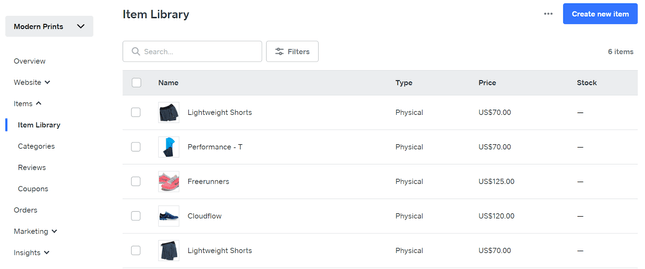
On the other hand, Squarespace is by no means difficult to use – it’s just a little more advanced than Square Online (and that shines through in Squarespace’s stunning templates, which we’ll cover in the next section!).
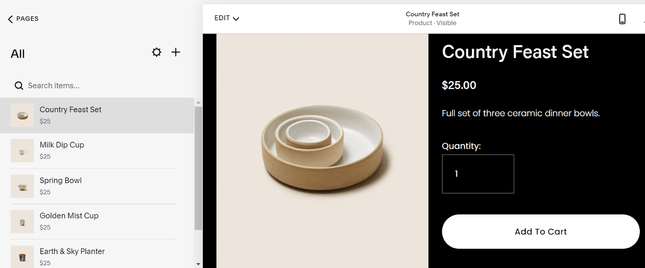
Squarespace lets you edit a lot of product information without leaving the template editor. With Square Online, you’re able to edit basic product info in the template editor, but you’ll have to go back to the dashboard to make most changes.
SEO
Square Online makes it really easy to incorporate search engine optimization (SEO) best practices into your store. SEO covers everything you can do to increase your page’s chance of ranking highly in Google search results.
The global SEO market is expected to reach $5.7 billion by 2027, and Square makes it an effortless investment, with built-in guidance to help you as you go.
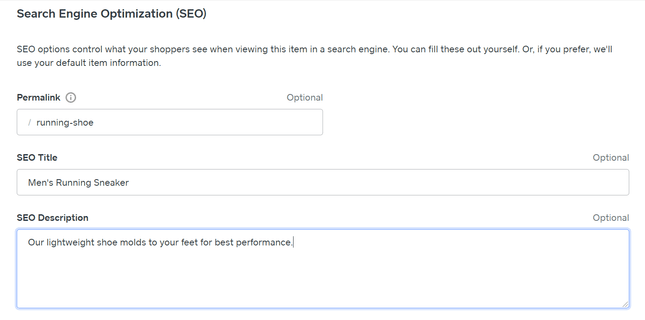
On the other hand, Squarespace’s SEO tools aren’t as easy to use – but they’re more powerful than Square Online’s. If you’re okay with learning as you go, then Squarespace’s tools can really help your store rank higher, faster.
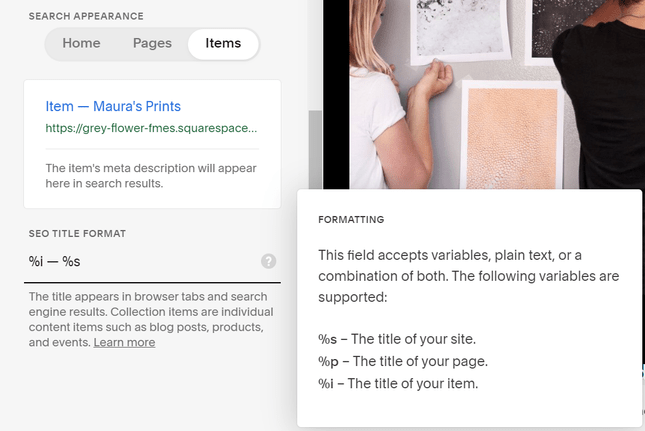
Squarespace will even automatically convert your image descriptions into alt text, which is the information Google uses to understand images.
Domains
Both Square and Squarespace make it easy to connect a domain name if you already have one. You can do this on any of their paid plans.
If you want to purchase a new domain name, you don’t have to go through a third-party registrar – both Square and Squarespace will let you search for and register a domain through your account dashboard.
This is a major win for both platforms’ ease of use, because you can manage more of your website’s details all in one place. Domain names are included free for the first year of any paid Squarespace or Square Online plan. After that, domain name costs start at $20 per year with Squarespace, and $12 per year with Square Online.
Both platforms also let you switch over an existing custom domain, which is great news if you’re planning on switching providers. Keep in mind that Square Online’s free plan doesn’t allow this, so you’ll have to be on the cheapest plan first.
Further Information
- Find out how much a domain name costs before you buy.
- Check out the best website builders for SEO.
Which Is Better Value for Money?
The Winner
Squarespace has better value for money
Square Online lets you sell for free– so it’s a better option if you’re sticking to a strict budget – but Squarespace offers better value for your money, earning the highest value score in our testing with a 4.6 out of 5. The built-in features that come with Squarespace ecommerce plans, such as customer accounts, are higher quality than what you’ll get on Square Online’s cheapest plans. If you’re switching providers, you don’t want the new tools you use to be downgraded from what you used before.
While selling for free is certainly an attractive prospect if you’re switching or upgrading providers, Square Online’s free plan may put limits on how big you can grow your business, whereas Squarespace’s plans give you what your money is worth in regard to ecommerce features.
Squarespace’s Pricing Plans
Squarespace’s starting plan, the Personal, begins at $16 per month (billed annually) and comes with everything you could need to build a website: blogging, scheduling, and social media integration. While you can’t have a traditional ecommerce store selling physical products until you upgrade, you can sell digital courses and guides while on this plan. From our experience, no other provider offers that type of deal, making Squarespace an excellent choice for an online-focused business.
Squarespace’s cheapest ecommerce plan is the Business plan, which costs $23 per month. We recommend the Business plan for people who are new to selling online, and only want to start out with a few products.
The Business plan charges a 3% transaction fee on each purchase, so you’ll outgrow it quickly as sales pick up. In that case, we recommend the $27 per month Basic Commerce plan, which has powerful built-in features and no transaction fees.
Square Online’s Pricing Plans
Square Online is a rare ecommerce builder in that it lets you sell on its free plan. This is a major perk, but we don’t recommend it as a long-term solution. You’ll still have ads on your site, which can make it look unprofessional. And you won’t be able to use a custom domain without upgrading to a paid plan.
If you do decide to upgrade to a paid plan, you’ll have two options ranging from $29 to $79 per month. Square Online raised its prices 142% since last year, originally only costing $12 per month on its cheapest plan, and topping our best value for money ranking. However, this price hike has meant its score has lowered considerably, even with the free plan – it now sits at 4.1 out of 5.
Of these, we recommend the $29 per month Performance plan, because it’s the most on par with Squarespace in terms of features. On the Performance plan, you’ll have the ability to send abandoned cart emails to drive conversions, and post customer reviews on your site to increase trust.
What About Additional Products?
If you’re willing to invest a little more in optional tools, then Squarespace’s Email Campaigns feature is worth looking into.
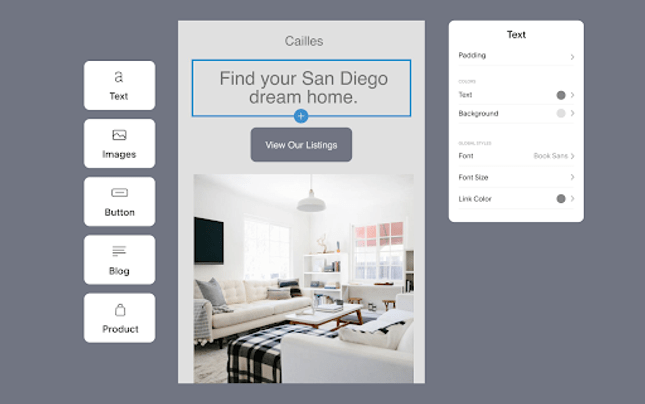
This is Squarespace’s in-house email marketing service, and prices start at $5 per month. For that price, you’ll be able to send 500 emails each month to an unlimited list of subscribers.
The main benefit of tying your email marketing to your Squarespace site is that your designs and branding will be consistent, and you’ll be able to manage everything in one place.
Further Information
- Our Squarespace Pricing review covers each Squarespace plan in detail.
- Our Square Online Pricing review can help you pick your perfect Square plan.
Design Functionalities: Which Offers More Creative Control?
The Winner
Squarespace has better design functionality
Square Online: Easy but Limited
Square Online doesn’t offer a very big library of templates. You can filter your search to retail, restaurant, service, and nonprofit templates, but there’s not a lot of variation between them.
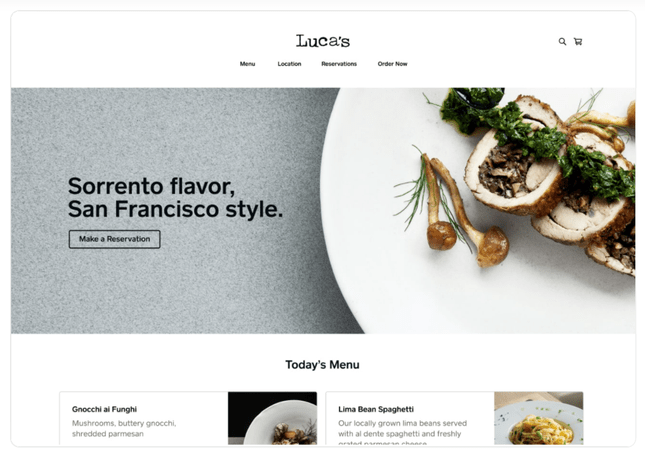
Square Online’s templates are clean and easy for visitors to navigate. They get the job done, but they’re not unique. One user put it best:
“It’s easy to customize the template, but there only seems to be one default template that you can then customize to your liking – there’s not much choice unless you’re willing to really play around with the layout.”
The upside is that Square Online templates are really easy to edit – you can quickly customize fonts, color schemes, and your company logo.
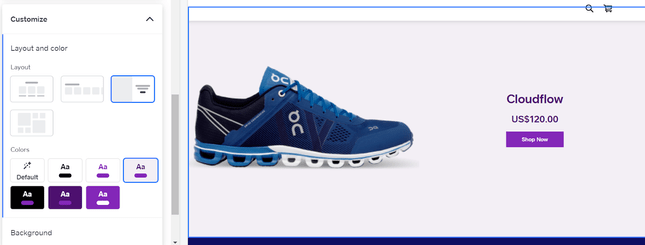
Tweaking colors and fonts helps you add a personal touch.
If you’re more concerned with simplicity and playing it safe design-wise, then Square Online’s templates will do – their limited customization and run-of-the-mill layouts still meet the standards for ecommerce best practice, so if you stick to them you’ll be fine. But if you’re really trying to build a brand, then we recommend going with Squarespace instead.
Squarespace: Stunning Designs
Squarespace’s template editor will take you a few more minutes to get used to than Square Online’s, but it’ll pretty much be smooth sailing after that. And template designs are one of the areas where Squarespace really shines – it came out as the best website builder for creatives in our research, with an overall design functionality score of 4.7 out of 5.
Here’s what one user had to say in testing:
“Squarespace’s templates look incredibly professional. There was enough of a range, too, with Squarespace providing a description of features that each template has embedded. It was really useful to base your decision on the features you wish to incorporate into your store.”
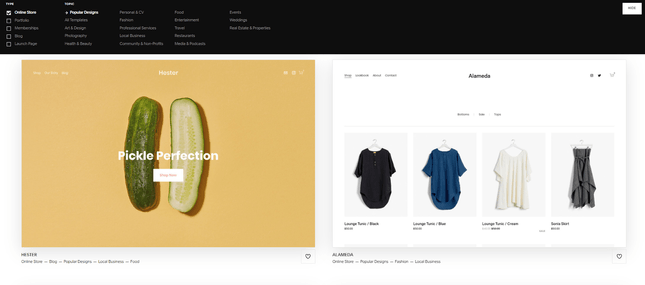
Every Squarespace ecommerce template comes with a Products page where you can display your items. It’s easy to customize any page on your Squarespace template, and you have more freedom than you would with Square Online.

Not only can you customize color schemes and font styles, you can also edit button styles and even change the margins of your website (ideal for anyone selling visual products, like photographers and artists!).
Adding and removing sections on each page can also be done in the click of a button. There are plenty of options for different sections, from cleanly designed “Contact Us” forms to maps showing your business location.
Further Information
- Check out the best web design trends of 2021.
- Learn how to build a brand online with our guide.
Which is Best for Selling Online?
The Winner
Squarespace has the best ecommerce tools
Square Online: All the Basics
You can sell products on Square Online’s free plan, which is a major perk for anyone starting out. However, unprofessional ads and a domain ending in “.square.site” mean most businesses will outgrow the free plan pretty quickly.
Like with any website builder, the amount of ecommerce features you’ll get with Square depends on which pricing plan you choose.
That said, the ecommerce feature that really impressed us when we used Square Online was its inventory management.
Square Online lets you update your stock to reflect the following changes:
- Receiving new stock
- Recounting inventory
- Restocking returns
- Losing stock due to damage or theft
This isn’t the most exciting feature around, but as you may know it is a really important tool for an ecommerce store. What is exciting about Square is its POS system. This allows you to accept physical payments, meaning you start running your business out of a brick-and-mortar store and potentially double the amount of traffic. Square POS syncs all online and offline payments, and is especially useful for restaurants or other food-based businesses, even operating specific packages for those that want to switch to them.
Squarespace: Powerful Built-in Features
Although Squarespace’s starting plans are more expensive than Square Online’s, you’re really getting your money’s worth in terms of features. We recommend the Basic Commerce plan for most businesses, since it’s more scalable than the Business plan and has more of what you need built-in.
Squarespace offers its users:
- 0% transaction fees
- Unlimited bandwidth and storage
- Abandoned cart recovery
- Gift card creation
- Customer accounts
Additionally, Squarespace gives you more pay options than Square Online, letting you and your customers continue to use PayPal, Stripe, and AfterPay
Further Information
- See how Square and Squarespace both rank in our review of the best ecommerce website builders on the market.
Which Offers More Payment Options?
The Winner
Squarespace has better payment options
Payment Options
Most website builders offer a few ways to accept payments on their more basic ecommerce plans, with more options becoming available if you upgrade to a more advanced plan.
Square Online’s cheapest plan offers the following payment options:
- Square
- Apple Pay
- Google Pay
Squarespace’s cheapest ecommerce plan offers:
- Stripe
- PayPal
- Apple Pay
- Afterpay (only available in the US, Australia, and New Zealand)
Because Square integrates with its own in-house payment processor, its other options are more limited than Squarespace’s. The upside is that using an in-house tool can make your life easier as the merchant – but for your customers’ sakes, you’ll want to choose a website builder that can accommodate as many different payment methods as possible.
Every payment processor charges its own fees, and you’ll have to pay the same payment processing fees regardless of which website builder you’re using. Most payment processing fees are pretty similar – for example, Square, Stripe, and PayPal all charge 2.9% + 30¢ on each purchase.
Transaction Fees
While payment processing fees are third-party costs, transaction fees are what you’re charged by your website builder for each transaction you make.
Squarespace charges a 3% transaction fee on the Business plan, and charges no transaction fees on the Basic Commerce and Advanced Commerce plans.
Square charges 2.9% + 30¢ on its Free, Professional, and Performance plans, and 2.6% + 30¢ on its Premium plan. If you’re using Square as your payment processor, then this transaction fee is the only fee you’ll have to pay – you won’t be charged for the identical payment processing fee. But if you use a third-party service like PayPal, then you’ll have to pay this transaction fee in addition to PayPal’s own payment processing fee.
Which Has The Best Marketing Features?
The Winner
It’s A Tie! Both Square Online and Squarespace have equally good marketing features
Let’s take a look at the marketing features you’ll get on each platform’s cheapest ecommerce plan. For Square Online, that’s the $29 per month professional plan. For Squarespace, that’s the $23 per month Business plan.
Square Online Plus Plan
- Website pop-ups
- Discount promo codes
- Order information emails
- Personalized ordering
Squarespace Business Plan
- Website pop-ups
- Discount promo codes
- Order information emails
- Website analytics
- Keyword support
What Apps Do They Offer?
The Winner
Squarespace has the best app store
App stores are a vital feature of any website builder. They give you access to the hyper-specific tools your website relies on. As much as website builders try, they can’t have every feature and tool built in.
Square Online has over 300 apps, designed for mainly ecommerce purposes. You can order custom-printed merchandise with Printful, keep your taxes in order with Bookkeep, and get customer reviews with Trustpilot. Before our last testing, Square Online’s app store didn’t provide that much extra support, but Square has improved the usability of its app store recently. So we gave it a higher score of 3 out of 5 in our research, a 50% increase.
Squarespace, on the other hand, completely overhauled its app store since we last tested from something barely there to a top-quality extension library.
Squarespace Extensions doesn’t have apps – it has customized website plugins, meaning each of them has been custom-made for the Squarespace platform. This would explain their number: there are only 36 of them. But each one is built with Squarespace utility in mind, meaning it integrates seamlessly into your store. It’s more quality over quantity, which is why Squarespace’s app store rating in our research shot 100% from 2 to 4 out of 5.
Which Offers Better Security?
The Winner
It's a Tie! Both Squarespace and Square Online have good security
Both Square Online and Squarespace have got your ecommerce store covered when it comes to security. Part of the appeal of all-in-one website builders (like these two) is that you don’t have to worry about handling security measures yourself.
Here’s what comes included with both platforms:
- Secure Sockets Layer (SSL) Certificates: SSL certificates keep your customers’ payment information safe by encrypting data that passes between your server and a customer’s web browser.
- PCI-DSS Compliance: The Payment Card Industry Data Security Standard is a security standard for organizations that handle most major credit cards. Both Square and Squarespace are PCI compliant, and by extension, so is your website.
Further Information
- Take a deeper dive into each provider with our Square Online Store Review and our Squarespace Review.
Which Has Better Customer Support?
The Winner
Squarespace has better customer support
Both Square Online and Squarespace performed really when we tested their customer support from our own accounts.
Square Online’s “live chat” function is actually a “support assistant” chatbot who, while speedy and helpful, isn’t as good as speaking with a real person:
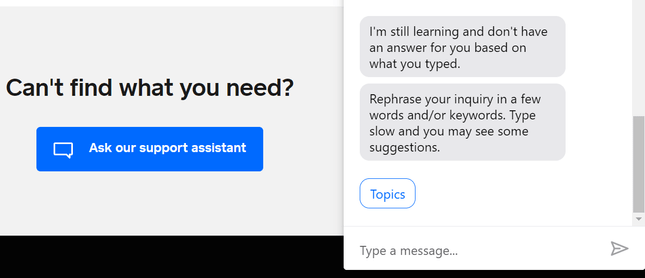
…Which is why we were really impressed that Square Online offers phone support. If you ever get sick of the chat function, you can speak to a representative over the phone. And while Squarespace’s live chat actually puts you in touch with a real person:
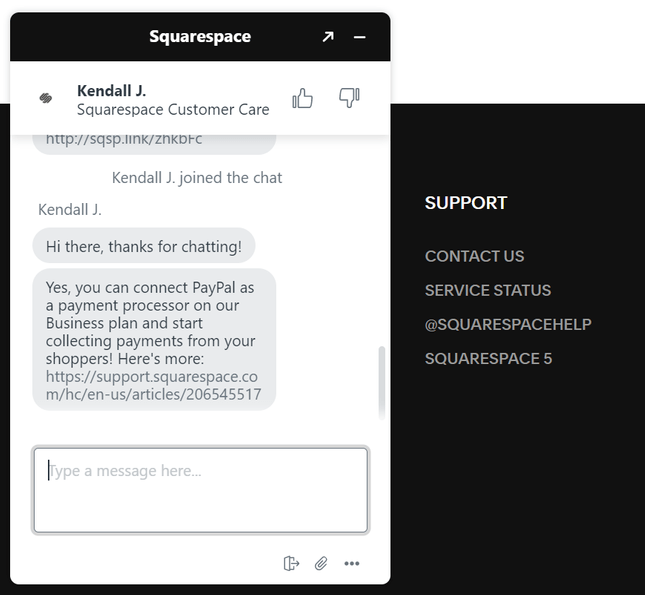
But it doesn’t offer any phone support, which could be a dealbreaker for some.
However, what won the versus in Squarespace’s favor is its superior knowledge center. You can find in-depth answers and clear, step-by-step guides for just about every issue you could face. For switchers and upgraders, this means there should be no bumps in the road when transferring from your old provider.
Square Online has a knowledge center too, but it’s a lot more disorganized and not as comprehensive. If you’ve got a business to run, it’s oftentimes quicker to search and solve the issue yourself – and a good knowledge center is key for this.
12 Square vs. Squarespace: The Bottom Line
From our experience, when you’ve seen how both builders perform against each other, it can often make the decision even harder. Let’s reiterate the main points of each builder:
Square Online
- Ecommerce-focused website builder
- You are able to sell for free
- POS system allows both online and in-person sales
- Fewer features and design flexibility
- Strong marketing features
- Best for: those looking to sell online that already have a physical business, such as restaurant owners
Squarespace
- All-rounder website builder (i.e.: can include commerce functions)
- Best value for money in our research
- Professionally-designed templates and creative control
- Super easy to use
- Best for: any user looking to upgrade or switch and build a great-looking website for good value
Square Online vs Squarespace: Summary
In this article, we’ve taken a look at Square vs. Squarespace in all of the most important categories.
Squarespace is our overall winner. Its combination of stunning designs and powerful features make it ideal for people growing their store and/or building a unique brand. However, Squarespace won’t be for everyone. The best thing to do is to check out for yourself which builder is for you.



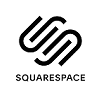
6 comments